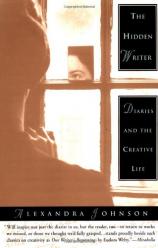Reading Group Guide
Discussion Questions
The Hidden Writer

1. If writing, as Kafka notes in his journal, is "the ax that breaks the frozen sea within," how do diaries help further the creative process?
2. To what extent do we, as journal writers, invent a self to "perform" in our diaries?
3. Whom do we tell, in Virginia Woolf's words, when we tell "a blank page?" Who is the audience--ourselves, others, or our future selves?
4. What are you looking for when you read a published diary? Discuss which of the seven writers in The Hidden Writer most fulfills your notion of what a diary can best illuminate.
5. What are the most common obstacles to a writing life that each diarist explores? Discuss the different solutions the seven writers found to overcoming stumbling blocks ranging from self-censorship to professional envy.
6. How do the diarists in The Hidden Writer manage to use their journals as far more than a dumping ground for anger or depression? How did they transform raw emotion into actual stories or novels?
7. How did the Tolstoys' "open" diary policy--letting each other read their diaries--affect both their marriage and their subsequent diary writing?
8. What do you think prompted Leo Tolstoy's gift of his bachelor diaries to his future wife?
9. Was rebellion a necessary spur to their creative lives? To creative lives generally?
10. Privacy and solitude were apparently indispensable conditions for both Mansfield and Woolf as writers. How did they balance this need with other demands on their time and energy?
11. How did each woman's marriage affect her creativity?
12. Although close friends, Mansfield and Woolf often felt they were competing with each other. Did their unspoken rivalry stimulate or hinder their imaginative productivity as writers?
13. Eventually Mansfield and Woolf each found her own voice. How did they help each other in their individual quests?
14. Alice James used her diary as a way to compete within a creative family. In what ways did the diary serve her ambition; in what ways did it limit her artistic range?
15. What circumstances allowed writers such as Louisa May Alcott or Charlotte Brontë to authorize themselves to earn a living through writing?
16. The 19th-century "cure" for a woman's "creative split in mind and body" was often bed rest and the removal of all intellectual stimulation. What are some of the sources of that creative split in modern writers or diarists?
17. Had they both lived, what might have been the creative fate of Marjory Fleming or Anne Frank? What is the shift in how a child's creativity is now fostered by diary keeping?
18. May Sarton kept her diaries with publication in mind. How might this affect the diary? Discuss the merits and drawbacks of such a practice.
19. For many readers, May Sarton's journals continue to provide important life lessons around solitude, illness, fame, and creativity. Who are other "elders" who inspire by passing on their lived insights?
20. Can a diary lie, as in the case of Anaïs Nin, and still have a larger life truth about it?
21. What psychological forces were at work within Nin so she felt it necessary to hide her original diaries and invent decoy ones? Is Nin an isolated case of the untruthful diarist?
22. Discuss how diaries serve as a refuge of privacy in a world wired for global connection. How, if any, will diaries change in an age of e-mail and the Internet?
The Hidden Writer
- Publication Date: April 13, 1998
- Paperback: 288 pages
- Publisher: Anchor
- ISBN-10: 0385478305
- ISBN-13: 9780385478304







